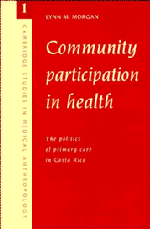Book contents
- Frontmatter
- Contents
- List of illustrations
- List of tables
- Acknowledgments
- List of abbreviations
- 1 The political symbolism of health
- 2 Banana medicine: the United Fruit Company in Costa Rica
- 3 The international imperative: foreign aid for health in Costa Rica
- 4 The primary health care movement and the political ideology of participation in health
- 5 Participation in Costa Rica: dissent within the state
- 6 La Chira: participation in a banana-growing community
- 7 The political economy of participation
- References
- Index
7 - The political economy of participation
Published online by Cambridge University Press: 29 January 2010
- Frontmatter
- Contents
- List of illustrations
- List of tables
- Acknowledgments
- List of abbreviations
- 1 The political symbolism of health
- 2 Banana medicine: the United Fruit Company in Costa Rica
- 3 The international imperative: foreign aid for health in Costa Rica
- 4 The primary health care movement and the political ideology of participation in health
- 5 Participation in Costa Rica: dissent within the state
- 6 La Chira: participation in a banana-growing community
- 7 The political economy of participation
- References
- Index
Summary
Political economists of health stress global economic forces and cultural imperialism as the major determinants of ill health in the Third World (see Doyal 1979; Elling 1981). While certainly the effects of global dependency and imperialist policies are important elements of health status in Latin America, critical analysis has dwelt almost exclusively on the deleterious effects of international capitalism (Morgan 1987a). But this sort of economic determinism is not subtle enough to account for the history or political-economic contingencies of any single country. Understanding the dynamics of the capitalist world system will not tell us why the metaphors of health and democracy were so compelling in the Costa Rican context, or why participation became the center of such controversy. For that we need to look both inside and outside national boundaries, at the linkages among local history, class structure, and interest-group politics within the context of international dependency. This study has focused much of its analytic gaze on national politics, but that discussion has been purposely sandwiched between larger and smaller levels of analysis. We are forced constantly to look back and forth from the intrigues of the capital city to the bureaucratic and political tangle of international aid, from the partisan battles of San Jose to the micro-politics of La Chira's inhabitants, acting on motivations of duty or guilt or vengeance. Unlike other political-economic studies of health that acknowledge only the dichotomy between capitalist protagonists and exploited victims, this book has emphasized the mediating role of the state.
Community participation in health is indisputably a noble goal, worthy of the concerted attention it has received in international health circles.
- Type
- Chapter
- Information
- Community Participation in HealthThe Politics of Primary Care in Costa Rica, pp. 159 - 166Publisher: Cambridge University PressPrint publication year: 1993

